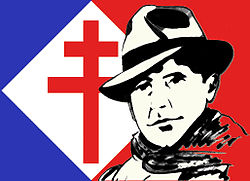You can help expand this article with text translated from the corresponding article in French. (February 2021)Click [show] for important translation instructions.
|

The Appeal of 18 June (French : L'Appel du 18 juin) was the first speech made by Charles de Gaulle after his arrival in London in 1940 following the Battle of France. Broadcast to France by the radio services of the British Broadcasting Corporation (BBC), it is often considered to have marked the beginning of the French Resistance in World War II. It is regarded as one of the most important speeches in French history. In spite of its significance in French collective memory, historians have shown that the appeal was heard only by a minority of French people. De Gaulle's 22 June 1940 speech was more widely heard. [1] The historic importance of these radio broadcasts and de Gaulle's future status as the emblem of the French resistance gave de Gaulle the nickname L'Homme du 18 juin (The Man of 18 June). [2] [3]




